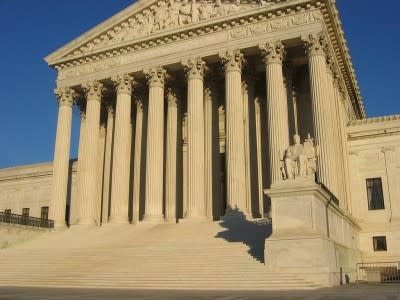Another big week on tap for the Supreme Court
The Supreme Court will hear two significant cases and announce more decisions this week, as the nation’s highest court swings back into gear. Among the highlights: a TV dispute, truth telling in political campaigns, and a possible big decision from a case heard last October.
The two big cases involve a dispute over the Aereo TV service, which is being bitterly opposed by the major television networks, and a controversy in Ohio that makes it a crime for people to make false statements during political campaigns.
But first up will possible decisions that could come down this week from the Court’s nine justices.
At the top of the list of cases heard last fall is the affirmative action case of Schuette v. Coalition to Defend Affirmative Action. The Schuette case is about a challenge to Proposal 2, an amendment to the Michigan Constitution that voters approved in 2006 banning affirmative action in the state. The question in Schuette is whether the state of Michigan violated the 14th Amendment’s Equal Protection Clause when it amended its state constitution to ban affirmative action programs in its universities and in the public sector.
The justices heard on October 15, 2013 in the Schuette case. A decision in the other major case from last October, McCutcheon v. FEC , was announced on April 2.
There also two major cases from last November that haven’t been decided.
In November, the Court heard arguments in Town of Greece v. Galloway, where the Justices will decide whether a town council’s practice of beginning its legislative meetings with a prayer session violates the First Amendment’s Establishment Clause.
Another big case involves international treaties and the 10th amendment: Bond v. the United States. The Bond case could impact a landmark 1920 Supreme Court decision: Missouri v. Holland. The Holland decision gave Congress the power to pass laws to carry out the U.S. government’s obligations under international treaties.
Among the six new cases the Justices will hear this week is an interesting doubleheader for Tuesday.
First up on Tuesday, after the Court announces decisions from previous cases, is the case of Susan B. Anthony List v. Steven Driehaus, which is about a controversial Ohio statute, the ability of groups affected by it to challenge the law, and related First Amendment free speech issues.
The law is called Ohio Revised Code Section 3517.21 and it explicitly defines what is called “impermissible campaign speech.” In fact, there are at least 10 different ways a person can be punished for making a false statement, according to the law. In Ohio, a violation is a misdemeanor with a penalty of up to six months in jail and a $5,000 fine.
In 2010, during U.S. House race between then-Democratic Representative Steven Driehaus and a Republican opponent, the Susan B. Anthony List, an anti-abortion group, tried to start a billboard campaign accusing Driehaus of supporting taxpayer-funded abortions by voting for the Affordable Care Act.
Driehaus asked the Ohio Elections Commission to block the ads, saying his vote didn’t directly fund abortions and the SBA List violated the Ohio law. The billboards never went up after Driehaus’ lawyer threatened legal action.
Almost two dozen groups have filed friend of the court briefs in the case, including an unusual, and funny, brief co-written by the Cato Institute’s Ilya Shapiro and humorist P.J. O’Rourke.
The Justices will then hear arguments in American Broadcasting Companies, Inc. vs. Aereo, Inc. The highly publicized case involves a copyright battle between a tech TV startup and the major television networks that could affect the future of broadcast television.
Aereo is a company that provides a paid service used by people with computers, and it allows customers to watch broadcast TV programs on a computer that are also available for free over the airwaves.
The TV networks are deeply upset that Aereo can resell their broadcast TV signals without permission or compensation and fear the precedent will erode their revenue models, which depend on retransmission fees and contracts with sports organizations.
Recent Constitution Daily Stories
The day when America became a global power
Podcast: Can a Constitutional Convention succeed?
Five myths about the start of the Revolutionary War
Benjamin Franklin’s last days, his funeral, and a U.S. Senate slight



